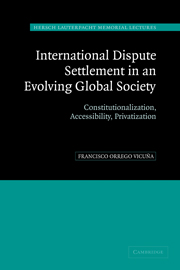 International Dispute Settlement in an Evolving Global Society
International Dispute Settlement in an Evolving Global Society Published online by Cambridge University Press: 04 August 2010
The public system of international adjudication performs an essential function in the settlement of disputes, both in inter-state relations and in a number of situations that involve individuals and other private parties. However, as has been shown in the preceding chapters, there is a constant need to facilitate dispute settlement in a broader context, particularly in so far as disputes increasingly involve private interests in a global market, regardless of whether states or other private parties are involved. This has led to the development of an alternative dispute resolution system for intermational disputes. This system is already one of the central features of international society and will no doubt be further developed in the years ahead. This chapter will examine some of the recent improvements in this field, explore some relevant domestic experiences and their possible influence on international developments, and present some proposals on how these developments might evolve into a structured system interconnected with public courts and tribunals.
Enhancement of an international alternative dispute resolution system
Alternative dispute resolution has been described in a domestic context as a halfway house between the certainty of the adversarial system and the flexibility of private negotiation. But it does not exclude adjudication in its entirety. In fact, adjudication as a result of arbitration is very much a part of the developing alternative dispute resolution system, as are decisions of a number of tribunals established for different specialized purposes. Only exceptionally has arbitration been excluded from alternative dispute settlement arrangements.
To save this book to your Kindle, first ensure [email protected] is added to your Approved Personal Document E-mail List under your Personal Document Settings on the Manage Your Content and Devices page of your Amazon account. Then enter the ‘name’ part of your Kindle email address below. Find out more about saving to your Kindle.
Note you can select to save to either the @free.kindle.com or @kindle.com variations. ‘@free.kindle.com’ emails are free but can only be saved to your device when it is connected to wi-fi. ‘@kindle.com’ emails can be delivered even when you are not connected to wi-fi, but note that service fees apply.
Find out more about the Kindle Personal Document Service.
To save content items to your account, please confirm that you agree to abide by our usage policies. If this is the first time you use this feature, you will be asked to authorise Cambridge Core to connect with your account. Find out more about saving content to Dropbox.
To save content items to your account, please confirm that you agree to abide by our usage policies. If this is the first time you use this feature, you will be asked to authorise Cambridge Core to connect with your account. Find out more about saving content to Google Drive.